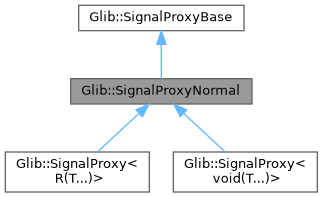The SignalProxy provides an API similar to sigc::signal that can be used to connect sigc::slots to glib signals. More...
#include <glibmm/signalproxy.h>

Public Member Functions | |
| ~SignalProxyNormal () noexcept | |
| void | emission_stop () |
| Stops the current signal emission (not in libsigc++) | |
 Public Member Functions inherited from Glib::SignalProxyBase Public Member Functions inherited from Glib::SignalProxyBase | |
| SignalProxyBase (Glib::ObjectBase *obj) | |
Protected Member Functions | |
| SignalProxyNormal (Glib::ObjectBase *obj, const SignalProxyInfo *info) | |
| Creates a proxy for a signal that can be emitted by obj. | |
| sigc::slot_base & | connect_impl_ (bool notify, const sigc::slot_base &slot, bool after) |
| Connects a signal handler to a signal. | |
| sigc::slot_base & | connect_impl_ (bool notify, sigc::slot_base &&slot, bool after) |
| Connects a signal handler to a signal. | |
Additional Inherited Members | |
 Protected Attributes inherited from Glib::SignalProxyBase Protected Attributes inherited from Glib::SignalProxyBase | |
| ObjectBase * | obj_ |
Detailed Description
The SignalProxy provides an API similar to sigc::signal that can be used to connect sigc::slots to glib signals.
This holds the name of the glib signal and the object which might emit it. Actually, proxies are controlled by the template derivatives, which serve as gatekeepers for the types allowed on a particular signal.
For signals with a detailed name (signal_name::detail_name) see SignalProxyDetailedBase.
Constructor & Destructor Documentation
◆ ~SignalProxyNormal()
|
noexcept |
◆ SignalProxyNormal()
|
protected |
Creates a proxy for a signal that can be emitted by obj.
- Parameters
-
obj The object that can emit the signal. info Information about the signal, including its name, and the C callbacks that should be called by glib.
Member Function Documentation
◆ connect_impl_() [1/2]
|
protected |
Connects a signal handler to a signal.
This is called by connect() and connect_notify() in derived SignalProxy classes.
- Parameters
-
notify Whether this method is called by connect_notify() or by connect(). slot The signal handler, usually created with sigc::mem_fun() or sigc::ptr_fun(). after Whether this signal handler should be called before or after the default signal handler.
◆ connect_impl_() [2/2]
|
protected |
Connects a signal handler to a signal.
◆ emission_stop()
| void Glib::SignalProxyNormal::emission_stop | ( | ) |
Stops the current signal emission (not in libsigc++)